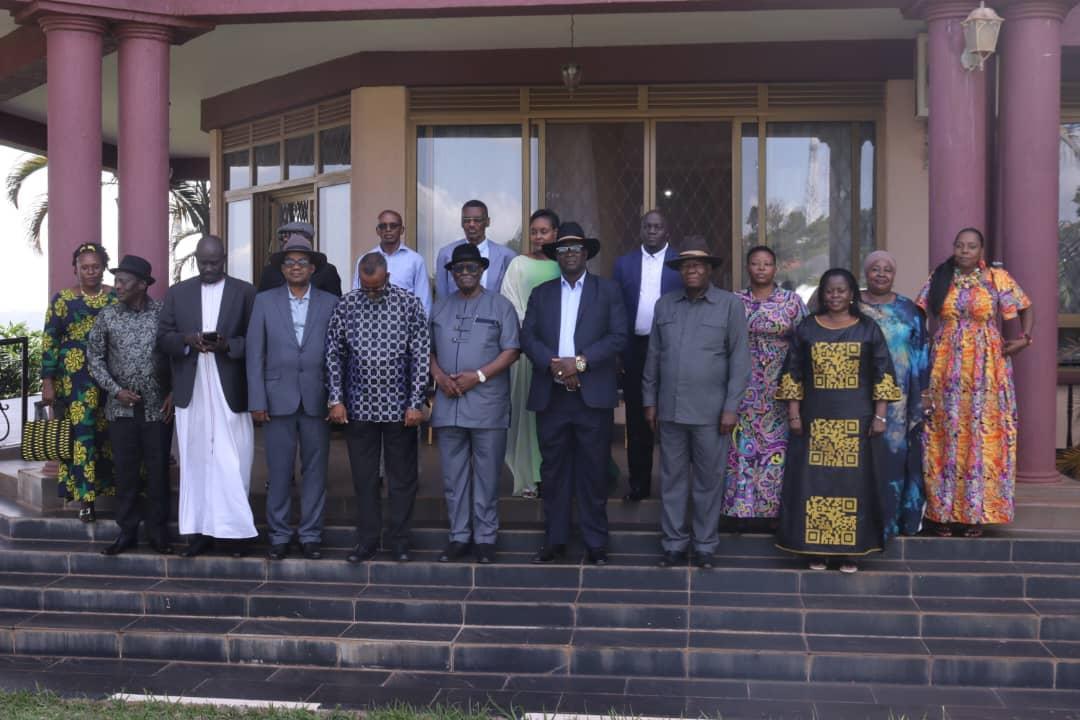Africa-Press – Uganda. King Emmanuel Gaseb of Namibia’s Witbooi Kingdom has paid a historic visit to Busoga Kingdom in eastern Uganda, where he called for unity among African monarchs to reclaim the continent’s heritage and chart a new path for traditional leadership in modern governance.
The visit, a powerful show of pan-African cultural diplomacy, took place at the Kyabazinga’s Palace in Igenge, Jinja City, formed part of a broader benchmarking programme endorsed by the Ugandan government, selecting Busoga and Buganda as models of effective cultural governance.
King Gaseb, flanked by Uganda’s Ambassador to Namibia, Prince Joseph Ndawula Ssajabi, was welcomed by Second Deputy Prime Minister Osman Noor Ahmed and several Busoga ministers.
The Namibian delegation’s visit focused on learning from Busoga’s cultural administration, education, and integration of traditional institutions in national development.
Minister for Kyabazinga Affairs Yudaya Babirye underscored the importance of the exchange and expressed gratitude to the government for facilitating such visits.
But she also raised long-standing grievances over the kingdom’s access to mineral royalties.
“The kingdom has to go through local councils to access its rightful share of royalties. This hinders our ability to fully benefit from our own resources,” she said, pointing to Busoga’s mineral wealth and the underutilised tourism potential of the River Nile’s source.
She challenged African monarchs to take control of natural resources and reduce dependence on foreign investors, who, she argued, reap disproportionate benefits from the continent’s riches.
“Busoga has the source of the Nile, but our Kyabazinga remains a symbolic ‘King of the Nile’ without tangible returns from it,” she said.
Babirye called on traditional leaders to become more vocal at platforms such as the African Union, where cultural issues are often overlooked by political leaders.
“Where political leaders may fall silent, cultural leaders must speak up for Africa’s heritage,” she urged.
On education and social welfare, Minister for Education Nantale Nasabu praised the Kyabazinga’s commitment to holistic development.
She cited the Gabula Royal Foundation and other kingdom initiatives that have skilled over 40,000 youth, with more than 12,000 entering the workforce in the last ten years.
She noted that many beneficiaries had received bursaries and material support from partners aligned with the kingdom’s vision.
“Education in Busoga is not just about books. It’s about integrating our values and preparing our children to be responsible citizens,” she said.
The Kyabazinga, William Wilberforce Gabula Nadiope IV, was commended for his global advocacy, especially in the fight against teenage pregnancy, which earned him recognition from the United Nations as an ambassador for ending the practice.
Prime Minister Osman Noor Ahmed spoke of the delicate balance between tradition and modernity. He warned against the erosion of culture due to unchecked Western influence and emphasised the institution’s role in complementing state efforts.
“Our cultures are similar, and this should be a point of unity. It is now up to us, the traditional leaders, to fill the gaps left in child upbringing and moral guidance,” he said.
King Gaseb expressed deep appreciation for the welcome and insights shared.
He lamented that colonial legacies had conditioned African communities to distrust each other, warning that such divisions continue to undermine collective progress.
“It is time we reverse that. We must unite, not just with each other, but also with our governments, to serve our people better,” he said.
The exchange ended with renewed energy and commitment to cultural revival, leaving both kingdoms with a shared mission to elevate traditional leadership and safeguard African identity in the face of global change.
For More News And Analysis About Uganda Follow Africa-Press






